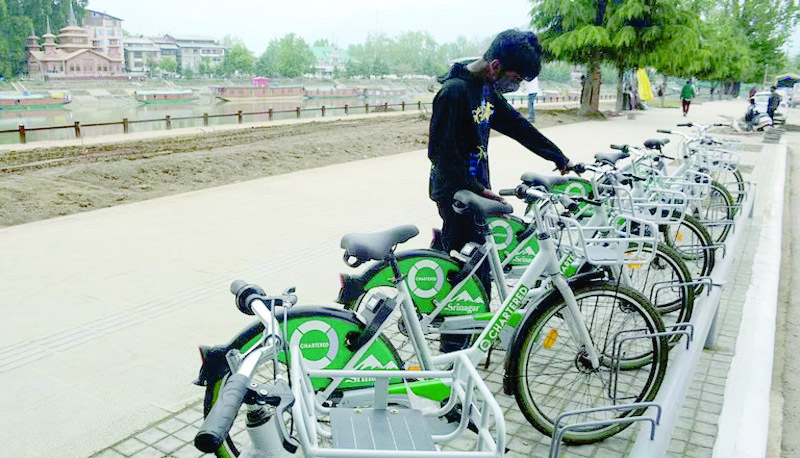In a major boost to sustainable transport under the Smart City initiative, Srinagar has recorded the highest e-bicycle ridership among five other cities where the service is operational — outperforming Bhopal, Ranchi, Surat, Kolkata, and Prayagraj.
Launched on May 20, 2023, the app-based bicycle rental service has emerged as a game-changer for city commuters, offering an eco-friendly alternative amid rising traffic congestion and pollution. The project is a joint effort between Ahmedabad-based Chartered Bike and Srinagar Smart City Limited (SSCL).
Currently, 1,000 bicycles, including 900 pedal-powered and 100 electric, are deployed across the city, all fitted with GPS tracking. These are accessible through 76 docking stations in key locations such as Lal Chowk, Dalgate, Hazratbal, Eidgah, Chanapora, and Bemina. Commuters can rent bikes via a mobile app, with the first 30 minutes free and a nominal charge of ₹5 per hour thereafter. A lifetime subscription is available for a one-time deposit of ₹300.
Srinagar’s e-bicycle service has logged an impressive 2,71,485 rides, covering 7,01,170 kilometers since launch. This has resulted in a CO₂ offset of 1,74,338 kg — equivalent to the annual carbon absorption of over 8,000 mature trees.
The figures echo the findings of a 2019 The Energy and Resources Institute (TERI) study, which noted that replacing motorised vehicles with bicycles for short-distance trips could save India up to ₹1.8 trillion annually through fuel savings, reduced emissions, and health benefits.
Speaking about the success of the e-bicycle service, Mehran Khan, Division Head at Chartered Bike, expressed delight at the city’s response. “We hoped for positive engagement, but Srinagar’s ridership has exceeded all expectations. The city now tops our charts nationwide, showing how well the service aligns with commuter needs.”
He added, “This isn’t just about ridership numbers. It’s about demonstrating the power of green mobility. Srinagar is setting a national example.” Locals have embraced the service enthusiastically.
Muneeb Naqshbandi, a student, said, “Public transport can be unreliable and cabs are costly. These bicycles are affordable, convenient, and eco-friendly.”
Ayaan Qureshi, another student and cycling enthusiast, shared, “For someone like me who loves cycling, this service is perfect. I get my daily dose of exercise while riding to tuition — and it’s still faster than being stuck in traffic. It’s also affordable, which really matters for students.”
Echoing nostalgia and pride, Basharat Lone, a resident of Rajbagh, said, “Bicycles were the norm in my youth. It’s heartening to see them return — but smarter and safer now.”
Nazir Ahmad, a daily commuter from Bagh-e-Mehtab, shared, “Traffic has made driving frustrating. With these bikes, I’ve cut my commute time in half.”
With Srinagar leading the way in e-bicycle ridership, the city is demonstrating how sustainable transportation can transform urban mobility. As more cities across India explore greener alternatives, Srinagar’s success offers a promising example of how thoughtful infrastructure and community engagement can create cleaner, healthier, and more efficient cities for the future.








